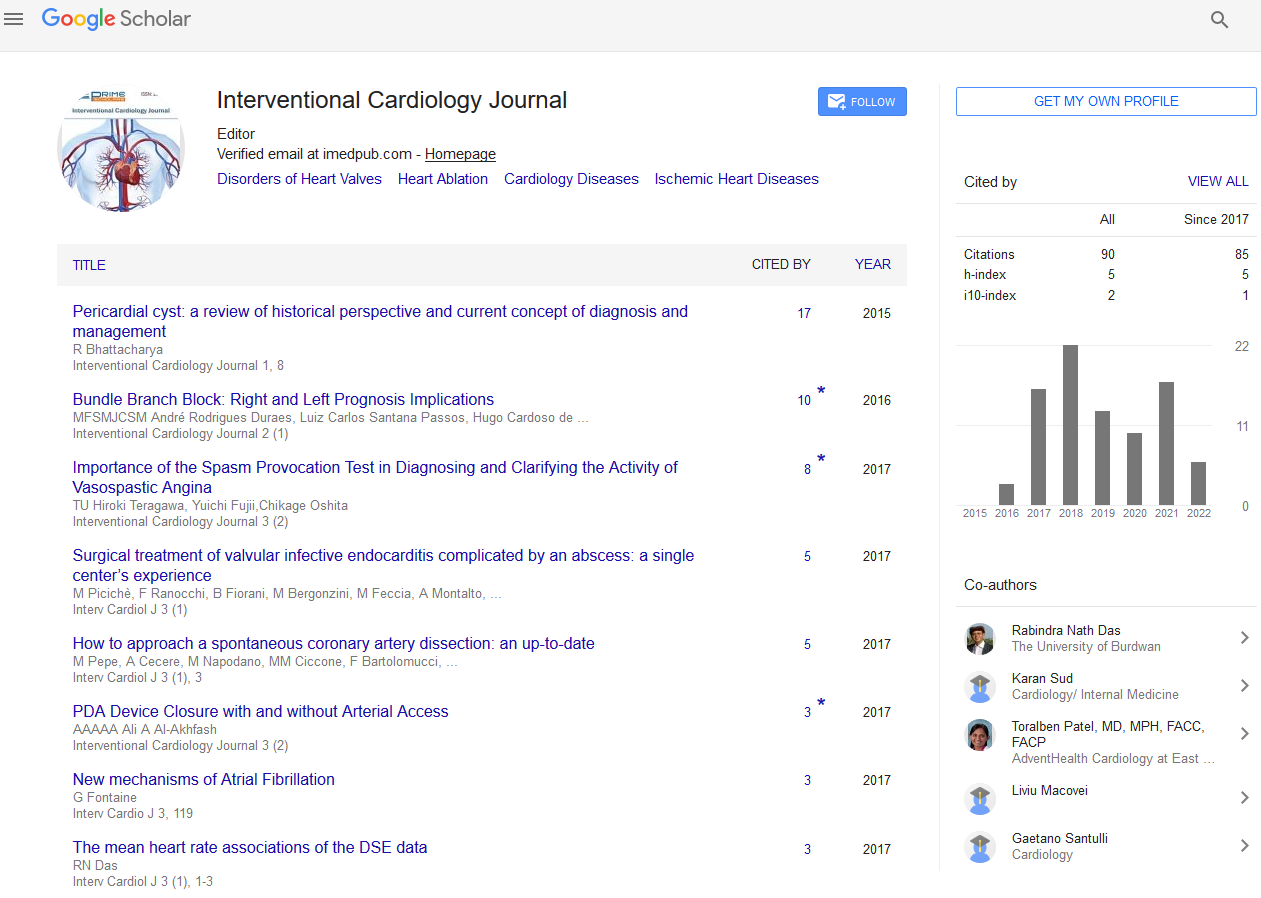Opinion - (2024) Volume 10, Issue 2
Revolutionizing Post-Interventional Cardiology Care: The Impact of Telemedicine
Portia Brown*
Department of Cardiovascular Science, King's College London, UK
*Correspondence:
Portia Brown,
Department of Cardiovascular Science, King's College London,
UK,
Email:
Received: 31-Jan-2024, Manuscript No. IPIC-23-19074;
Editor assigned: 02-Feb-2024, Pre QC No. IPIC-23-19074 (PQ);
Reviewed: 16-Feb-2024, QC No. IPIC-23-19074;
Revised: 21-Feb-2024, Manuscript No. IPIC-23-19074 (R);
Published:
28-Feb-2024, DOI: 10.21767/2471-8157.10.02.20
Introduction
In recent years, the field of cardiology has witnessed a paradigm
shift in the way healthcare is delivered, thanks to advancements
in technology. One notable development that has transformed
post-interventional cardiology care is the widespread adoption
of telemedicine. Telemedicine, the use of telecommunications
technology to provide healthcare services remotely, has proven
to be a game-changer in managing patients after interventional
cardiology procedures. This article explores the profound impact
of telemedicine on post-interventional cardiology care. One of
the primary benefits of telemedicine in post-interventional
cardiology care is the improved accessibility to healthcare
services. Patients, especially those residing in remote or
underserved areas, now have the opportunity to connect with
their healthcare providers without the need for physical visits.
This increased accessibility ensures that individuals receive
timely follow-up care, reducing the risk of complications and
promoting better long-term outcomes. Telemedicine allows
for real-time monitoring of patients' vital signs, medication
adherence, and overall recovery progress. Post-interventional
cardiology care often requires close observation of factors such
as blood pressure, heart rate, and medication compliance.
With telemedicine, healthcare providers can remotely track
these metrics, enabling early detection of any potential issues.
Timely intervention can be initiated, preventing complications
and reducing the likelihood of hospital readmissions.
Description
Telemedicine empowers patients by providing them with
valuable information about their condition and fostering a
deeper understanding of post-interventional care. Virtual
consultations enable healthcare providers to educate patients
on lifestyle modifications, medication management, and the
importance of regular follow-up appointments. This proactive
approach to patient education enhances self-management
skills and encourages individuals to actively participate in
their own care, leading to improved overall health outcomes.
The implementation of telemedicine in post-interventional
cardiology care contributes to cost-efficiency and optimal
resource utilization. Patients can avoid the financial burdens
associated with travel, accommodation, and time away from
work for in-person visits. Additionally, healthcare facilities can
optimize their resources by reducing the strain on outpatient
clinics and minimizing the need for unnecessary hospital
readmissions. Telemedicine streamlines the healthcare
delivery process, making it more economical for both patients
and providers. Telemedicine facilitates regular check-ins and
follow-up appointments without the logistical challenges of
in-person visits. This convenience promotes higher patient
compliance with recommended post-interventional care plans.
The ability to consult with healthcare professionals from the
comfort of their homes encourages patients to actively engage
in their recovery journey. As a result, patient satisfaction
levels tend to increase, leading to a positive impact on overall
healthcare experiences.
Conclusion
The integration of telemedicine into post-interventional
cardiology care has ushered in a new era of patient-centric,
accessible, and cost-effective healthcare. By leveraging
technology to bridge the gap between healthcare providers
and patients, telemedicine has demonstrated its potential
to enhance monitoring, provide timely interventions, and
empower individuals to actively participate in their recovery.
As technology continues to evolve, the impact of telemedicine
on post-interventional cardiology care is likely to grow, bringing
about further improvements in patient outcomes and overall
healthcare efficiency. As technology continues to advance,
telemedicine will likely play an even more significant role in
shaping the future of cardiovascular care, ultimately leading
to better outcomes, increased patient satisfaction, and a more
sustainable healthcare system.
Citation: Brown P (2024) Revolutionizing Post-interventional Cardiology Care: The Impact of Telemedicine. Interv Cardiol J. 10:20.
Copyright: © 2024 Brown P. This is an open-access article distributed under the terms of the Creative Commons Attribution License, which permits unrestricted use, distribution, and reproduction in any medium, provided the original author and source are credited.

